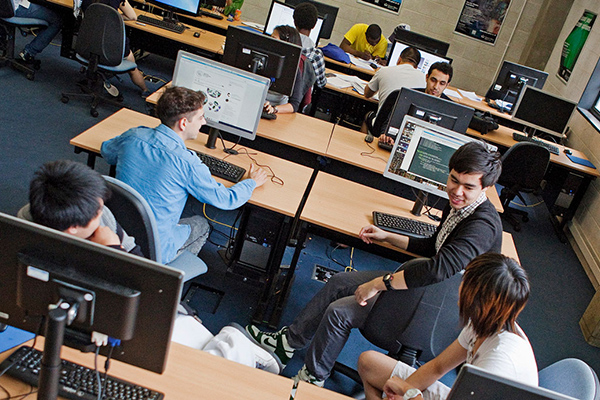Study options
- Starting in
- September 2025
- Location
- Mile End
- Fees
- Home: £15,250
Overseas: £33,500
EU/EEA/Swiss students
What you'll study
New analytical techniques deliver ever more data about genes, proteins, metabolites and the interactions between them. There is a high demand across the life sciences for trained bioinformaticians who can turn this data into useful information and new biological knowledge.
Specifically designed for students with bioscience backgrounds, this masters programme teaches you specialised skills needed to manage and analyse datasets, including computer programming, data analysis and statistics.
The research preparation and tailor-made multidisciplinary training you receive are of the highest standard available. In the second semester, you have the opportunity to delve into a topic that interests you and conduct your own substantial six-month research project.
Structure
- Four compulsory taught modules
- Group project
- Individual Computer-based Research Project
Compulsory/Core modules
This module provides an opportunity to further develop and apply skills learned during the previous MSc Bioinformatics modules, by conducting a novel piece of bioinformatics work, typically within an active research group either within QMUL or at a partner organisation. The specific nature of each project will be determined through discussions between the student, the course organiser and the project supervisor but will always involve data analysis and/or software development in a cutting edge area of biological or biomedical research. This serves as excellent preparation for future employment or PhD.
This module provides an introduction to data science and AI, focusing specifically on the analysis of molecular data produced by methods such as transcriptomics, proteomics and metabolomics. Lectures cover the methods, algorithms and resources used for tasks such as the identification and quantitation proteins and metabolites, determination of protein structure, discovery and recognition of patterns in these data using exploratory analysis and machine learning, data integration, interpretation of data in the context of prior knownledge, and large scale analysis of the interaction between biological molecules. Practical exercises are used to gain experience with software tools, data formats and databases of relevance to this field.
This module provides a hands-on introduction to computer programming (popularly known as 'coding') using a scripting language popular in the field. The focus is on producing robust software for repeatable data-centric scientific work. Key programming concepts are introduced, and these concepts are then brought together in answer biologically relevant questions.
This module is focussed on teaching statistical data analysis using the programming language R. The module will cover an introduction to coding with R, exploratory data analysis and visualisation, and fundamentals of statistical testing and learning. The module is taught through both theoretical lectures and computing practicals, the latter comprising of hands-on analysis of experimental data sets.
This module provides an introduction to the management and analysis of big data, focusing specifically on the analysis of genome sequence data. Lectures first introduce relevant data types and data handling skills. They subsequently cover the bioinformatics methods, algorithms and resources used for tasks such as read cleaning, genome assembly, gene finding, variant calling, population genomics, and caveats and quality control approaches for such analyses Practical exercises are used to imbue experience of the Unix command line, high performance computing, and the use of these technologies to run computationally intensive genome analysis tools.
In this module, students are organised into small teams (~3-4 members per team). Each team is given the same written specification for a piece of software that must be delivered by the end of the module. Each team must design an appropriate software architecture and development plan, with specific tasks assigned to individual team members. The project involves elements from the previous bioinformatics modules (genomics, post-genomics, coding and statistics) as well as new topics that are introduced during the module. This module serves as a simulation of a real software development environment, providing invaluable experience for future employability.
Assessment
- 50% Modules
- 50% Research project
You will be assessed through practical assignments, presentations and a 10,000 word dissertation.
Research project
The final research project is your chance to conduct in-depth independent research on a topic that is of interest to you and your career goals. Recent projects include:
- Understanding genetic factors involved in addiction and mental health
- Clinical utility of normal appearing tissues adjacent to tumour in breast cancer
- Comparative genomics and molecular evolution
- Microbial diversity in the deep biosphere
—Even though I have chosen a route in academia, the programming skills and expertise of the Bioinformatics MSc can be applied to handle any type of data, including industry. Completing this MSc helped to open up my career options and allowed me to choose what I really wanted to do.
Nazrath Nawaz, MSc Bioinformatics (2016). Now a PhD student in Computational Biology at Queen Mary University of London.
Teaching
This programme is devised and delivered by world-leading academics who are actively engaged in developing bioinformatics tools. The lecturers on this programme have specialist expertise in genome sequencing, proteomics, evolution, ecology, psychology, cancer, diabetes and other diseases. We also have an extensive network of academic and industrial collaborators around the UK and in Europe, who contribute to teaching, co-supervise projects and provide employment opportunities.
Where you'll learn
Facilities
- Linux computer lab
- Apocrita – Queen Mary’s high performance computing cluster
- Brand new Graduate Centre, offering purpose-built study spaces and an exclusive rooftop common room
- Think Pod – an interactive collaboration space with presentation, recording and video conferencing facilities
- Access to some of London’s outstanding facilities including the British Library, Senate House Library and Copac
Campus
You will undertake modules at Queen Mary’s Mile End campus in exciting east London. Mile End is the heart of our lively student community. Here you’ll be able to study and socialise with students and staff from over 160 countries around the world.

About the School
School of Biological and Behavioural Sciences
The School of Biological and Behavioural Sciences is one of the UK’s leading research departments, with a multi-disciplinary approach to teaching and research. We are a large and dynamic school with strong links with industry, offering students a stimulating and supportive learning experience.
Queen Mary University is also part of the Russell Group - a body of leading UK universities dedicated to research and teaching excellence.
We also collaborate with the School of Geography on the Centre for the Aquatic Terrestrial Environment (CATE). The facilities of which, some students can access for specific projects or modules.
Career paths
During your studies you'll have access to support at every stage in your degree, including one-to-one academic guidance, tailored workshops, and external guest speakers. Graduates of this course are well-placed to progress onto PhD research or careers in industry, consultancy and conservation.
Graduates from this course have progressed to:
- Software Engineer/Bioinformatician at European Bioinformatics Institute
- Informatics Assistant at Blizard Institute
- PhD Student at Queen Mary University of London
- Bioinformatics PhD Researcher at UCL Cancer Institute
- 91% of our postgraduate taught students are in employment or further study within six months of graduating (HESA GOS, 2021).
- 75% of those in work are in highly skilled employment and earning over the median salary (HESA GOS, 2021/22).
- £27000 The average UK salary 15 months after graduating for our postgraduates (HESA GOS, 2021/22).
Fees and funding
Full-time study
September 2025 | 1 year
- Home: £15,250
- Overseas: £33,500
EU/EEA/Swiss students
Conditional deposit
Home: Not applicable
Overseas: £2000
Information about deposits
Part-time study
September 2025 | 2 years
- Home: £7,800
- Overseas: £16,750
EU/EEA/Swiss students
Conditional deposit
Home: Not applicable
Overseas: £2000
Information about deposits
Queen Mary alumni can get a £1000, 10% or 20% discount on their fees depending on the programme of study. Find out more about the Alumni Loyalty Award
Funding
There are a number of ways you can fund your postgraduate degree.
- Scholarships and bursaries
- Postgraduate loans (UK students)
- Country-specific scholarships for international students
Our Advice and Counselling service offers specialist support on financial issues, which you can access as soon as you apply for a place at Queen Mary. Before you apply, you can access our funding guides and advice on managing your money:
Entry requirements
UK
Degree requirements
A 2:1 or above at undergraduate level in Biology or a relevant natural sciences subject.
Other routes
Applicants with a good 2:2 degree (55% or above) will be considered on an individual basis.
Find out more about how to apply for our postgraduate taught courses.
International
English language requirements
The English language requirements for our programmes are indicated by English bands, and therefore the specific test and score acceptable is based on the band assigned to the academic department within which your chosen course of study is administered. Note that for some academic departments there are programmes with non-standard English language requirements.
The English Language requirements for entry to postgraduate taught and research programmes in the School of Biological and Behavioural Sciences falls within the following English band:
Band 4: IELTS (Academic) minimum score 6.5 overall with 6.0 in each of Writing, Listening, Reading and Speaking
Please note, there are some postgraduate programmes with non-standard English language requirements in this School.
We accept a range of English tests and qualifications categorised in our English bands for you to demonstrate your level of English Language proficiency. See all accepted English tests that we deem equivalent to these IELTS scores.
Visas and immigration
Find out how to apply for a student visa.




